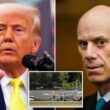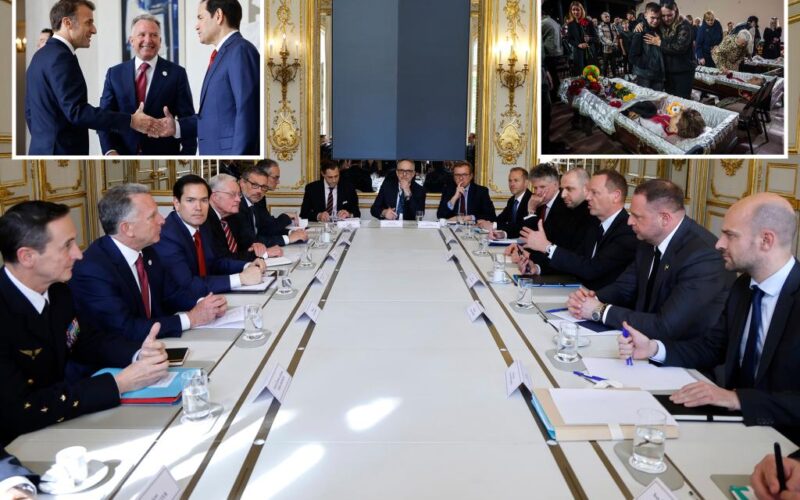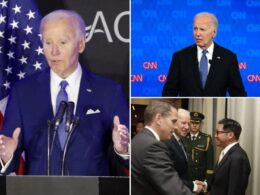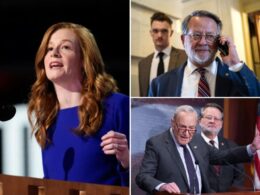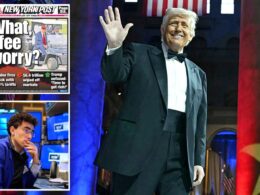WASHINGTON — US Secretary of State Marco Rubio and special presidential envoys Steve Witkoff and Gen. Keith Kellogg kicked off high-stakes talks in France Thursday with European and Ukrainian officials — marking the first time that both envoys were at the negotiation table to discuss an end to the war.
The trio met with French President Emmanuel Macron as well as Ukrainian President Volodymyr Zelensky’s chief of staff Andrii Yermak, senior administration officials told The Post.
The State Department had announced Wednesday that Rubio and Witkoff would make the trip to France, but gave a vague description of the visit in a brief statement that did not mention Kellogg or the presence of a Ukrainian delegation.
“Secretary of State Marco Rubio and Ambassador Steve Witkoff will travel to Paris, France, April 16-18 for talks with European counterparts to advance President Trump’s goal to end the Russia-Ukraine war and stop the bloodshed,” the State Department said.
“While in Paris, he will also discuss ways to advance shared interests in the region.”
The group was also expected to discuss the France and United Kingdom-led “coalition of the willing” — a group of roughly 30 countries, excluding the US, working to develop security guarantees for Ukraine.
This could include the possible deployment of peacekeeping troops should a full cease-fire or end to the war be reached.
Witkoff, who has so far only met with Moscow’s leaders on the Ukraine war, including Russian President Vladimir Putin, has tended to be more “sympathetic” to the Kremlin in peace discussions, experts told The Post.
Russia hawks hope that bringing both the envoys for Kyiv and Moscow together will help right that.
“The Trump administration has, for better or worse, decided to have two different envoys talking to each side, and one of them, Witkoff, is much closer to President Trump, and Witkoff is also seems to be more sympathetic to the Russian view of things,” said Foundation for Defending Democracies Russia program lead John Hardie.
“Some of that could be just a lack of exposure to the views of Ukrainians and European officials, so hopefully today, European colleagues can kind of impress upon some of their views, and perhaps, for example, why it’s not such a good idea to cave to Russian territorial demands.”
Still, Kellogg has been a longtime adviser and friend to Trump and helped successfully convince Ukraine to agree to a full cease-fire with Russia.
Kellogg previously worked for the National Security Council for the entirety of the president’s first term in office from 2017 to 2021.
However, the cease-fire, proposed by Trump, is still not in place, as Witkoff has so far been unable to convince Moscow to agree to the unconditional pause in conflict to open the door for peace negotiations.
After meeting Putin for five hours of talks last week, Witkoff indicated he believed Russia was open to a “permanent peace” deal — if the US agreed to support Moscow’s desire to annex five eastern Ukrainian oblasts.
Experts have warned against agreeing to Russia’s demands, saying it would reward the invading country and signal to adversaries, such as China, that the US won’t push back against illegal invasions of sovereign territories.
Kellogg is also against Witkoff and Putin’s proposal, with sources telling The Post he pushed back on the idea during a debrief of Witkoff’s meeting with Trump last Friday.
Separately, Defense Secretary Pete Hegseth also met with his French counterpart, Minister of the Armed Forces Sébastien Lecornu, at the Pentagon to discuss the ongoing war in Ukraine.
“The Secretary urged France to increase defense spending and, alongside other NATO allies, take primary responsibility for Europe’s conventional defense,” the Defense Department said in a readout of the visit.
“Secretary Hegseth and Minister Lecornu discussed related priorities, as well, including ongoing efforts toward a durable peace in Ukraine.”

